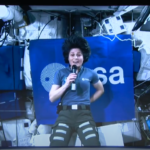A team from the University of Glasgow has won £600,000 in a government-run competition to develop a climate change satellite for launch from the UK.
The 10 students designed a satellite to analyse shorelines and coastal vegetation to help scientists and policymakers understand the impact of climate change on coastal regions, as part of the Nanosat Design Competition, run by the UK Space Agency and Department for Transport.
The winning team from Glasgow, named OirthirSAT, beat more than 40 teams from across the UK, aged between 16 and 37, with the judges praising their entry for identifying a clear way to tackle climate change and test new technologies.
Next generation of space experts
Transport Secretary Grant Shapps said: “With satellite launches due to start from home soil this year, there is no better time to support the next generation of space experts in developing satellites to support our mission against climate change.
“My congratulations go to OirthirSAT and everyone shortlisted for their hard work throughout this competition, and I applaud the innovation all the teams have shown throughout.”
The UK is set to become the first country in Europe to host small satellite launches in 2022, building on the UK’s leading small satellite industry and creating high skilled jobs across the country. This will also help UK scientists use space technology to help tackle global challenges, including climate change.
Innovative ideas
Dr Paul Bate, Chief Executive of the UK Space Agency, said: “Satellite technology plays a crucial role in monitoring our climate and it is fantastic to see so many innovative ideas to help tackle the most pressing issue facing our planet. My congratulations go to the winners from the University of Glasgow for their excellent design.
“The countdown to the first satellite launch from UK soil is on and this will be a historic year for our space sector. Being the first country in Europe to offer launch will boost our satellite industry further, creating hundreds of new jobs across the UK.”

